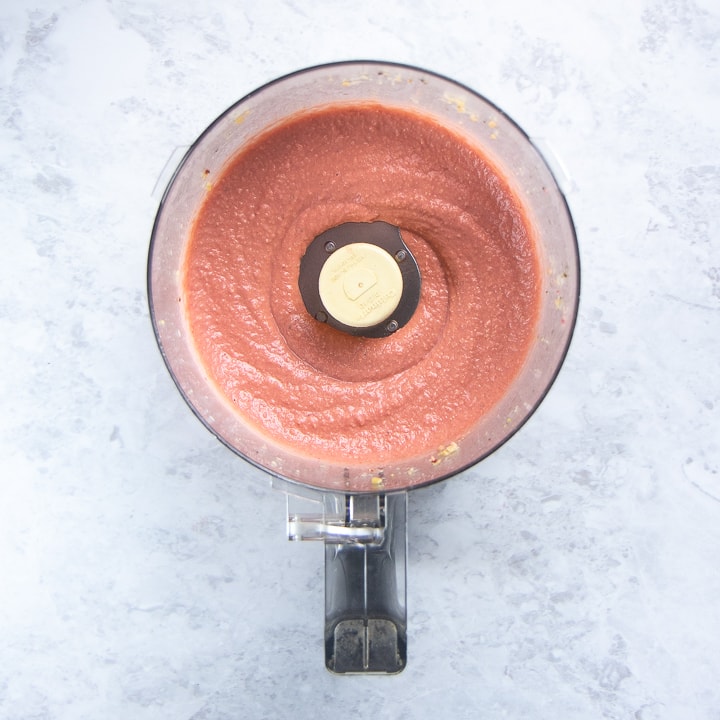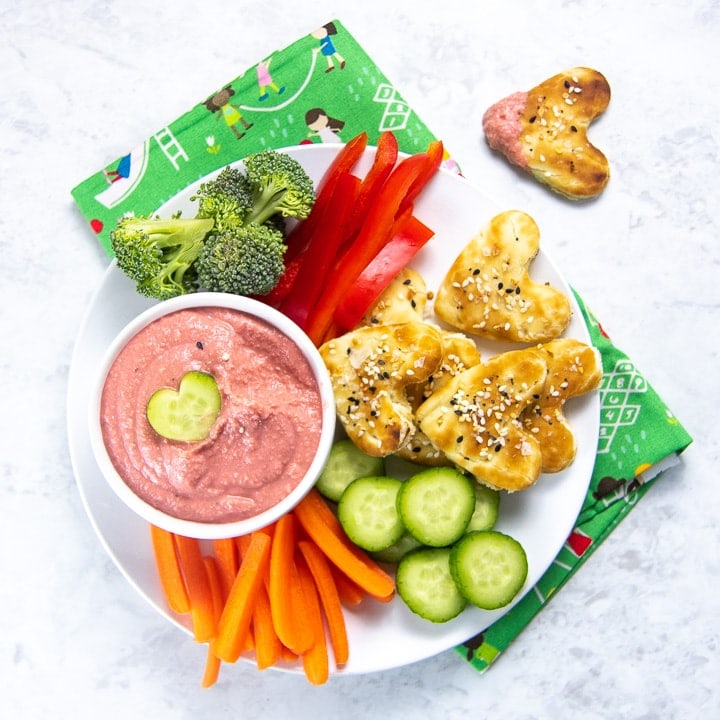Guide on Best Pregnancy Foods & Meals
When you’re expecting, eating the right foods can help ease morning sickness, fight fatigue, and balance blood sugar. Check out our expert guide on the best foods to eat during pregnancy, 10 foods to avoid, ideas for healthy and easy meals, and a weekly pregnancy meal plan.
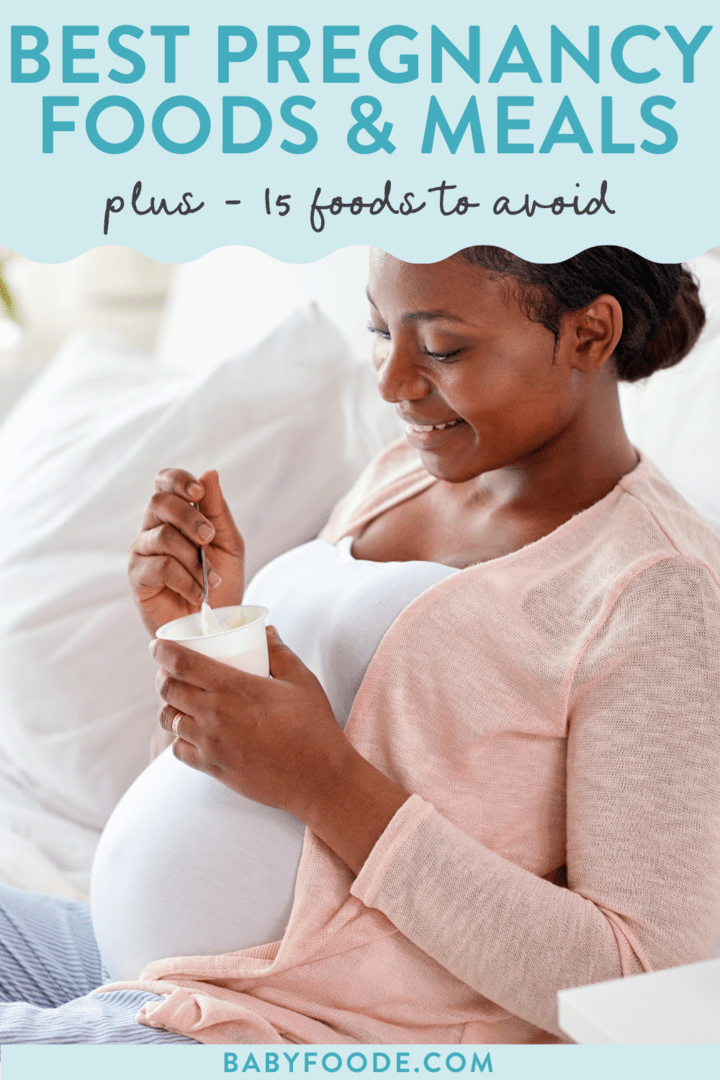
Medically reviewed and co-written by Jamie Johnson, Registered Dietitian Nutritionist (RDN), and Lauren Braaten, Pediatric Occupational Therapist (OT).
What to Eat During Pregnancy
Nutrition is important during pregnancy, for both you and your baby. Good nutrition helps you handle the extra demands on your body as your baby develops and grows. We know that it can be tough in the first trimester to eat healthy, especially when morning sickness, food aversions, and fatigue seem to take over.
No matter what point you’re at in your pregnancy journey, you’ll find essential information in our guide. Our goal is to help you keep your fridge and pantry well-stocked and your body well-fed. We’ve compiled a variety of healthy and easy ideas for breakfast, lunch, dinner, snacks, and even dessert.
Beet Hummus & Pita Chips
This healthy and delicious Beet Hummus is a great snack or meal to have while pregnant! Watch this video to see how easy it is to make!
Best Foods to Eat
The best foods to eat during pregnancy include many nutrient-dense options like berries, vegetables, nuts, seeds, salmon, beef, eggs and whole grains. These foods are great sources of fiber, vitamins, antioxidants, omega-3 fatty acids, protein and healthy fats.
Salmon
Salmon is a great source of the Omega 3 fatty acids DHA and EPA needed for your baby’s brain development.
Salmon Recipe Ideas:
- salmon salad
- salmon burgers
- salmon tacos
- salmon filet with whole grains and veggies
Milk
Milk is a good source of protein and calcium, both of which are important during pregnancy.
How to include milk into your diet:
- in a glass as a snack or with a meal
- in a bowl of cereal
- blended into a smoothie
- oatmeal or overnight oats made with milk
Greek Yogurt
Yogurt actually has more calcium than milk which makes it a great choice to help with your baby’s bone development. Greek yogurt has more protein than regular, but both are healthy options. Plus the probiotics in the yogurt can be good for digestion.
How to incorporate yogurt into your diet:
- bowl of fruit and granola
- blended into a smoothie
- in dressings and sauces
- use in place of sour cream
Whole Eggs
Eggs are packed with nutrients pregnant women and growing babies need, including protein and choline, the latter being vital for your baby’s brain development and preventing neural tube defects. Most women do not get enough, so eggs are an easy way to meet your needs, plus they are so versatile.
EGG RECIPE IDEAS:
- egg and spinach scramble
- omelet or frittata for breakfast
- a hard-boiled egg for a snack
- egg salad sandwich
- eggs included in homemade baked goods
Green leafy veggies
These include kale, spinach, collard greens, arugula, Romaine lettuce, cabbage, and many more. They are full of nutrients including fiber, calcium, iron, folate, and vitamins A, C, and K.
LEAFY GREEN RECIPE IDEAS:
- smoothies
- sandwiches
- salads
- soups
Nuts and Seeds
Nuts, especially walnuts, are chock full of healthy fats needed for your baby’s developing brain, plus protein, fiber, and other nutrients.
HOW TO ADD NUTS TO YOUR DIET:
- add any preferred nuts or seeds to a salad
- have a healthy trail mix for a snack
- add a few to your favorite smoothie
- use as spreads (almond/cashew/peanut butter)
- eat them plain
Whole grains
Whole grains are much more nutritious than white grains which are more processed. They’re full of fiber which can help combat constipation, and vitamins and minerals. Examples are oats, quinoa, barley, farro, brown rice, and whole-grain bread.
HOW TO ENJOY WHOLE GRAINS:
- oat energy balls
- warm oatmeal with chopped peaches
- baked oatmeal
- quinoa and veggie Buddha bowl
- overnight oats
Berries
Berries of all types- strawberries, blueberries, raspberries, blackberries, etc. are super nutritious and full of fiber, vitamin C, and antioxidants.
How to Add Berries to your Diet:
- blend them up in a smoothie
- use them as a sweet topping for yogurt or oatmeal
- eat them by the handful
- add them to a salad
Grass-fed beef
Grass-fed beef has more healthy fats than conventionally raised beef, but both are great sources of iron, which pregnant women need more of to keep up with an increase in blood volume.
Use Ground meat to make:
- spaghetti
- tacos
- soups
- meatballs
Avocados
Avocados are full of healthy fats, fiber, folate and potassium, which makes them a great pregnancy food.
How to enjoy Avocados:
- guacamole
- in tacos
- add to a smoothie
- salads
- avocado toast
Legumes
These include beans, peas, peanuts, lentils, chickpeas, and soybeans, which all contain fiber, protein, iron and folate needed to support a growing baby and belly.
Ways to include Legumes into your Diet:
- hummus
- add to a salad
- tacos
- curries
- soups
- roasted chickpeas make for a delicious snack
Frequently Asked Questions
This is so common in pregnancy, especially in the first trimester when nausea and food aversions are at their peak. Just eat what you can stomach, making healthy choices when you can. When possible, make your choices protein and nutrient-dense like smoothies, soups, eggs, Greek yogurt and fruit, etc. Smaller and more frequent snacks may be more tolerable than large meals.
Nutrition is so important during this time because what you eat has an impact on your baby’s development and the nutrients you store. Baby takes what they need of certain nutrients from mom and if mom isn’t getting enough, this can leave her deficient, which can affect her health. For other nutrients, your baby needs to get those through mom’s diet or supplements, and if your baby isn’t getting enough, this can affect her development and cause neural tube defects, developmental delays, or restricted growth. Or on the other end of the spectrum, your baby can put on more weight, putting her and mom at risk.
Unless it’s for health reasons (i.e. gluten-free diet for Celiac disease) or religious reasons, a diet is generally not a good idea, unless advised by your provider. Long-time vegans and vegetarians can continue to be plant-based, but it does take careful planning and most likely extra supplements to make sure you’re getting in the appropriate nutrients. It’s generally not advised to be on a diet for weight loss, unless directed by your provider.
Yes, you can eat too much or too little, which can put you and your baby at risk if you don’t gain enough or if you can too much weight. In the first trimester, you do not need any extra calories, but those needs increase in the 2nd and 3rd. Generally, 3 meals and 2 snacks a day is sufficient, but listen to your body as to when you are hungry and full. As long as you are eating a balanced diet, you should be ok.
First Trimester
This is usually the trimester when women have nausea and food aversions so if this is the case, focus on what you can eat, even if it’s just carbohydrates. Another reason to take your prenatal vitamins is to make up for any deficiencies in your diet.
Folate
Folate is crucial during this period because neural tube defects can start to develop within the first month of pregnancy, before most women know they’re pregnant. That’s why it’s recommended you start a prenatal vitamin before conception. Also include beans, lentils, dark leafy greens and fortified cereals in your diet for dietary folate.
Iron
Your body is ramping up its blood production during this time, so extra iron is needed to support it. You can get iron from meat, poultry, seafood, beans, and greens.
Choline
Choline also helps protect against neural tube defects and supports your baby’s brain development. The best source of choline is whole eggs, but it can also be found in red meat, fish, nuts, legumes and cruciferous veggies like broccoli and cauliflower.
Calcium
Calcium is needed to support your baby’s developing teeth and bones. You can get it from foods like milk, yogurt, cheese, and dark leafy greens.
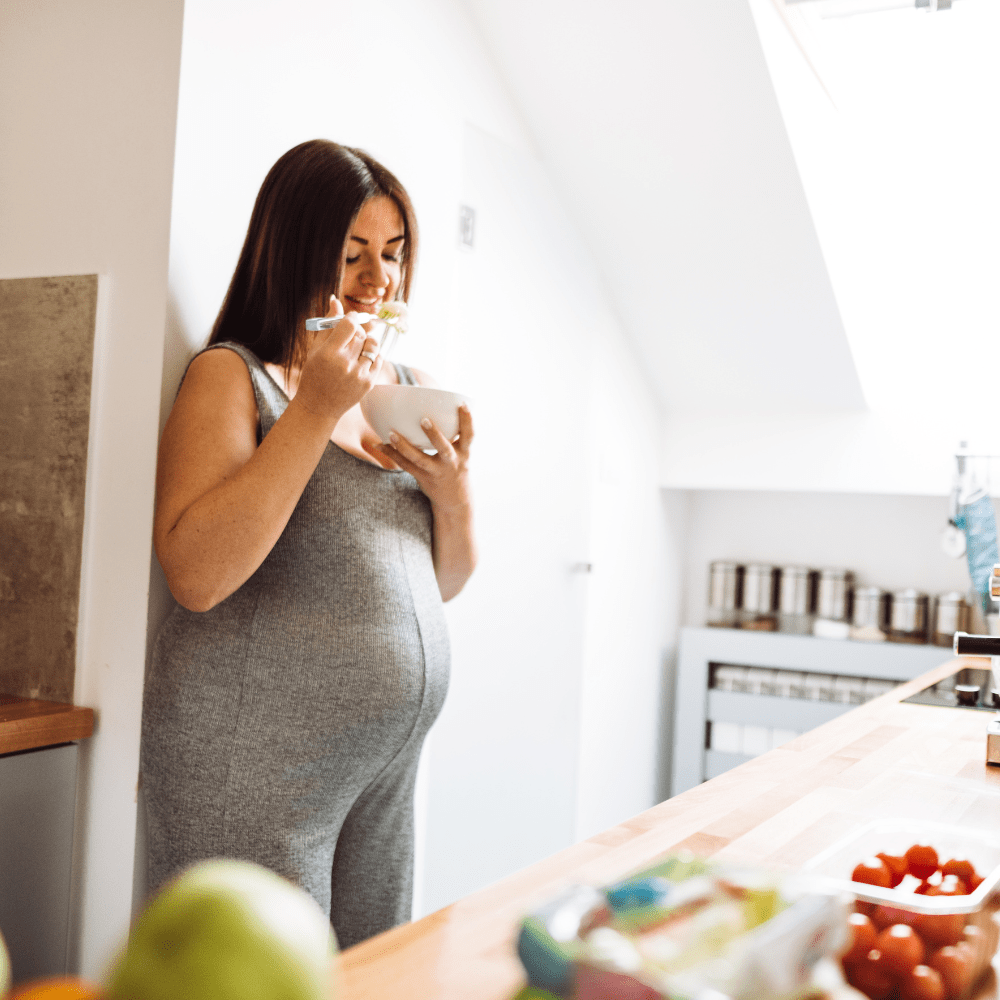
Second Trimester
In addition to iron, calcium, choline, and folate, you’ll want to make sure you’re getting enough of the following:
Protein
Protein needs to increase in the second trimester (as do calories) to support the growth of the baby and mom’s uterus and breasts. Meat, seafood, poultry, legumes, Greek yogurt, milk, nuts, and quinoa are some foods packed with protein.
Fiber
Many pregnant women experience constipation in the second and third trimesters but high-fiber foods can help alleviate it. Fiber is found in plant-based foods like fruits, vegetables, nuts, seeds, beans, and whole grains.
Vitamin D
Vitamin D helps to support teeth and bone development. Unfortunately, not many foods are high in vitamin D which is why many people are deficient in it. But you can get some vitamin D through fortified foods and juices, cheese, egg yolks, mushrooms, and fatty fish- and don’t forget sunlight.
Third Trimester
Magnesium
Magnesium can help relieve pesky muscle cramps that you might start to feel now. A deficiency in this important mineral could lead to premature labor so it’s essential to get enough. Add almonds, pumpkin seeds, oats, beans, and artichokes to your diet to help meet your needs.
Omega 3’s
These fatty acids support your baby’s brain development, immune system, heart, and eyes. The best source of Omega 3’s is fatty fish like salmon, tuna, and sardines but can also be found in flaxseeds, chia seeds, and walnuts.
Vitamin C
Vitamin C helps with iron absorption, which is very important in this trimester as your baby starts to build up iron stores from mom. Citrus fruits, tomatoes, broccoli, strawberries, and bell peppers are great sources of vitamin C.
Food Cravings
Thanks to pregnancy hormones, a heightened sense of taste and smell, and possible nutrition deficiencies, many women experience food cravings, some things they may never eat otherwise. As long as it’s a safe food that does not put you at risk of a foodborne illness, and you have it in moderation, you should be fine to indulge. If you’re craving a non-food item like starch or dirt, this is a condition called pica and you should consult your provider as this can be a result of a nutrient deficiency.
10 Foods to Avoid
Some foods should be avoided due to their risk of foodborne illnesses that can be harmful to mama and baby. Though the risk may be lower for some foods than others, it’s always best to err on the side of caution, especially when it comes to your baby.
Deli Meat and Smoked Meats
Cold cuts like turkey, ham, chicken, roast beef, etc., cured meats like prosciutto, hot dogs, chorizo, and smoked meats like salmon and sausages can carry listeria, which may or may not affect mom but can have life-threatening consequences for your baby. If you just have to have a deli sandwich, heat up the meat before you eat it to decrease the risk.
Raw fish
So long sushi! Unfortunately raw and undercooked fish can carry parasites and bacteria that can be harmful to mama and baby so it’s best to avoid for now. Fully cooked fish should be fine as long as it’s not high in mercury, in fact, it’s encouraged for pregnant women to consume 8-12 ounces a week.
High mercury fish
Too much mercury can cause brain damage in an unborn baby so it’s best to limit these kinds of fish, which include tilefish from the Gulf of Mexico, swordfish, shark, king mackerel, bigeye tuna, marlin and orange roughy.
Undercooked meat
Undercooked meat and eggs can harbor bacteria that cause toxoplasmosis and salmonella. Pregnant women are more at risk of foodborne illnesses due to a weakened immune system, and an infection could cause harm to the baby so it’s best to avoid them.
Raw eggs
Raw eggs are really never a good idea but they can carry salmonella, which can make mama very sick with food poisoning so skip the raw cookie dough for now.
Raw sprouts
Raw sprouts like bean sprouts and alfalfa sprouts can carry bacteria like salmonella, E.coli, and listeria that can put baby at risk of miscarriage, premature birth and infections at birth. Cook them until they reach 165º to reduce the risk.
Unpasteurized dairy and juices
Pasteurized means the product has been heated to a certain temperature for a certain amount of time to kill off bacteria like salmonella, E. coli, listeria, or toxoplasma. Unpasteurized dairy, like milk, cheese and yogurt, and juices, have not been through this process so carry a risk of these bacteria. Most dairy and juice sold in the U.S. is pasteurized but always read the label to make sure. If it’s labeled as raw or cold-pressed, it has not been pasteurized. If traveling abroad, be cautious as many countries do not require this process.
Premade deli salads
Things like chicken salad, egg salad, tuna salad, shrimp salad and coleslaw from the deli counter have a higher risk of carrying listeria, especially if they aren’t kept at the right temperature. And you can’t really heat them up like you can deli meat to reduce the risk so it’s best to avoid them.
Too much caffeine
Technically the recommendations in pregnancy for caffeine are 200mg a day, which is about 2 cups of coffee- not 2 Ventis from Starbucks, 2 8-ounce cups. But recent studies have shown that it might be best to avoid it altogether as it may increase the risk of smaller birth weight, behavior issues, attention difficulty, and hyperactivity in children since babies in utero do not have the enzyme needed to break down caffeine. More research is needed to change the recommendations so do what feels right for you.
Alcohol
Alcohol while pregnant has been linked to fetal alcohol spectrum disorders, which could include symptoms like behavioral problems, abnormal facial features, growth restriction, and intellectual disabilities among others, so there is no amount of alcohol that is considered safe for pregnancy. Don’t worry if you indulged in some drinks before you knew you were pregnant- your baby is likely fine-but best to ditch to booze now.
Healthy and Easy Meals
We all want easy meals to prepare, especially during pregnancy when the fatigue really hits and you hardly have enough energy to think of a meal, let alone make it. Here are some easy yet healthy ideas you may want to try.
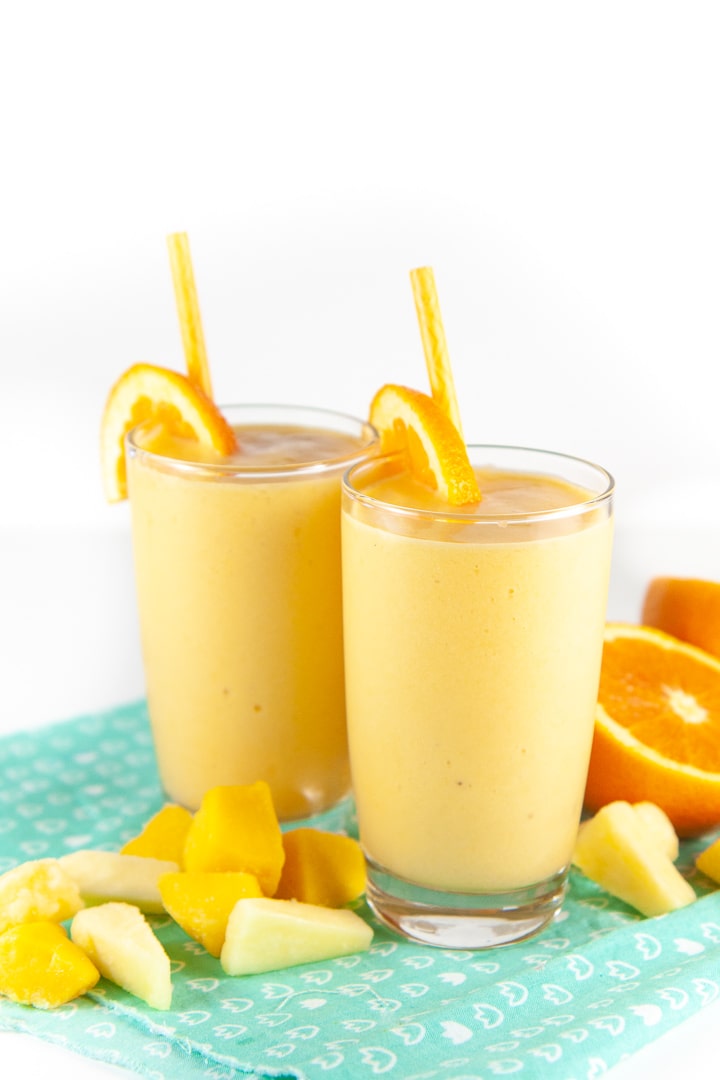
Pregnancy Breakfast Ideas
Try to eat breakfast, even if it’s something small. It can help keep nausea at bay, and it’s a great time to get some much-needed protein in. Here are some ideas:
- Green smoothie made with milk or yogurt
- Avocado and egg toast
- Oatmeal made with milk and berries
- Yogurt topped with berries
- PB and banana toast
- Berry overnight oats
- Pregnancy Smoothie
- Banana, chocolate overnight oats
- Blueberry peanut butter overnight oats
- Mint chocolate chia pudding
- Strawberry chia pudding
- Scrambled eggs, toast with jam and fruit
- Protein waffles topped with PB and fruit
- Spinach frittata
- Vegetable omelet
- Broccoli and cheese egg cups
- Potato and vegetable hash topped with fried eggs
- Baked oatmeal banana and berry casserole
- Breakfast casserole made with eggs, sausage and sweet potatoes
- Egg and cheese bagel
- Egg, tomato and feta breakfast muffins
- Egg, spinach and cheddar breakfast muffins
- Collagen blueberry muffins
- Cottage cheese and fruit
- Milk and whole-grain cereal and fruit
- Breakfast burrito with eggs, spinach and black beans
- Blueberry protein pancakes
- Huevos rancheros
- Breakfast parfait
- Smoothie bowl topped with granola
- Açai bowl

Pregnancy Snack Ideas
Snacks can be a lifesaver during pregnancy, especially in the 1st trimester if you’re nauseous and the 3rd trimester when you may start feeling fuller faster. Some women find that snacking throughout the day rather than having three large meals helps them meet their nutrition needs.
- Hummus and pita bread/chips
- Hummus and vegetables
- Guacamole and tortilla chips
- Apple and PB
- Pistachios and raisins
- Cheese stick and fruit
- Yogurt cup and berries
- Banana and PB
- Trail mix with nuts and dried fruit
- Peanut Butter energy balls
- Roasted chickpeas
- Celery and peanut butter
- Cottage cheese, fruit and granola
- Whole grain cereal and milk
- Whole grain crackers and cheese slices
- Pretzels and peanut butter
- Granola protein bar
- Rice cakes and peanut butter
- Boiled eggs
Pregnancy Lunch Ideas
Leftovers make for great lunches but here are some ideas you can whip up quickly, too.
- Fried egg sandwich with arugula and avocado
- Chicken and veggie wrap
- Turkey burger
- Caprese panini
- Black bean burrito
- Spinach, black bean and cheese quesadilla
- Chicken and vegetable quesadilla
- Greek wrap
- Grilled vegetable and hummus panini
- Tomato soup and grilled cheese
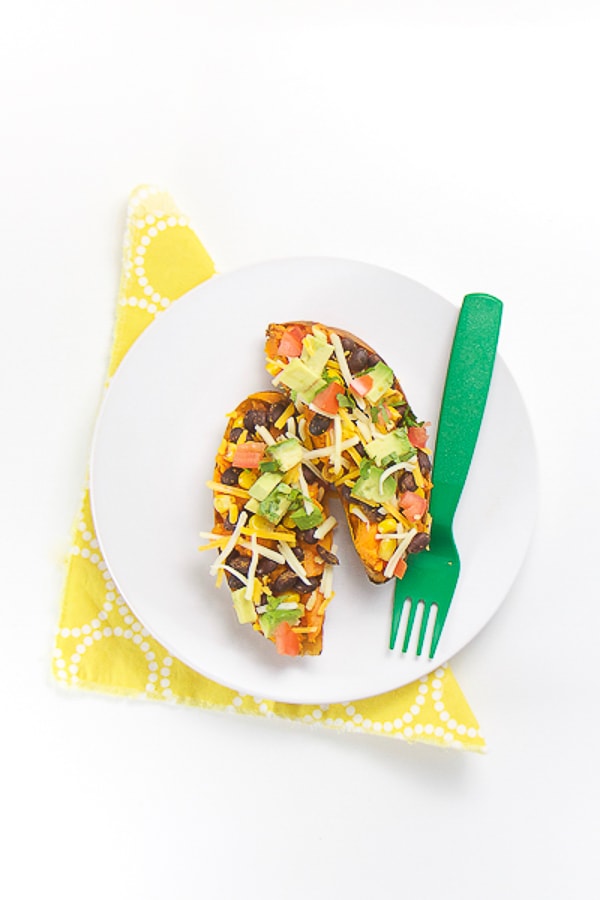
Pregnancy Dinner Ideas
Dinner is a great time to make up for any nutrients you were lacking throughout the rest of the day. You may want to assess what you ate that day and fill in the missing nutrients at dinner time.
- Salmon, wild rice and asparagus
- Beef spaghetti
- Shrimp and cabbage tacos
- Beef tacos
- Chicken enchiladas
- Lentil and carrot spaghetti
- Chicken Asian lettuce wraps
- Philly Cheesesteak Stuffed Peppers
- White Bean Chicken Chili
- Beef Chili
- Hamburger Salad Bowl
- Coconut Lentil Curry
- Quinoa and vegetable Buddha bowl
- Coconut Korma Curry
- Salmon burgers
- Lentil soup
- Chicken and coconut soup
- Shrimp and vegetable stir fry
- Burrito bowl
- Vegetable soup
- Steak salad
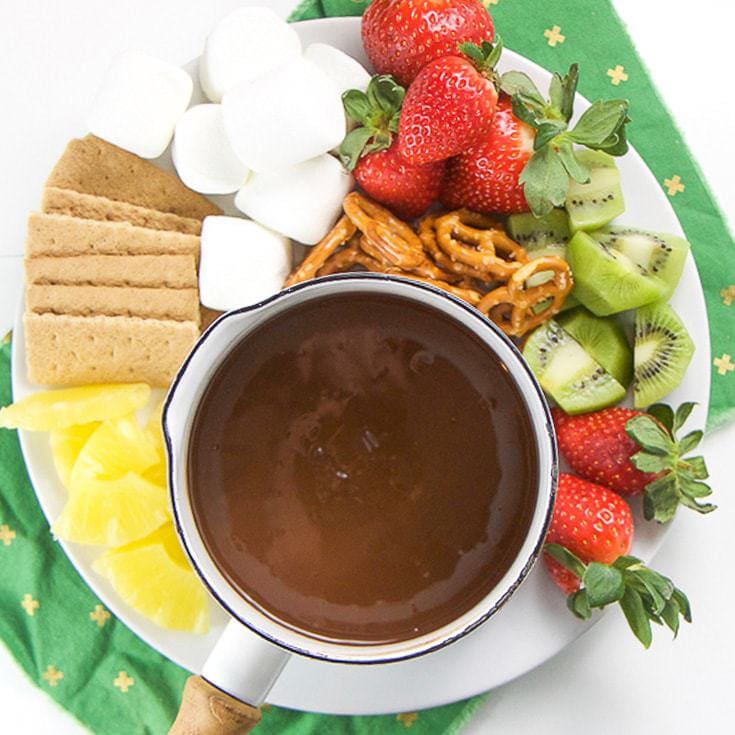
Pregnancy Dessert Ideas
It may be a good idea for you to have a snack before bed to keep hunger at bay, or just to help meet your energy needs. It’s best not to indulge in something too sugary too often in order to keep your blood sugar in the normal range. Here are some healthier dessert ideas.
- 100% fruit popsicle
- Banana and cocoa homemade “nice” cream
- Dark chocolate squares and strawberries
- Chocolate covered nuts
- Fruit bowl
- Greek yogurt with fruit and honey
- Chocolate Banana pops
- Grilled peaches and ice cream
- Chocolate fondue
- Popcorn and M&M’s
- Strawberry Shortcake
Weekly Pregnancy Meal Plan
Some people find it easier to meal plan for the week to make meal times less stressful. Here’s a sample meal plan for you.
Monday
Breakfast: Greek yogurt, berries and granola
Snack: Hummus and pita chips
Lunch: Greek salad pita pocket
Snack: Trail mix
Dinner: Salmon burgers and salad
Tuesday
Breakfast: Spinach and egg scramble with fruit
Snack: Carrots and guacamole
Lunch: Black bean burrito
Snack: String cheese and fruit
Dinner: Steak salad
Wednesday
Breakfast: Pregnancy Smoothie
Snack: Rice cake and peanut butter
Lunch: Chicken quesadilla
Snack: Whole grain crackers and cheese slices
Dinner: Fish tacos
Thursday
Breakfast: Broccoli, egg and cheese breakfast muffins
Snack: Apple and peanut butter
Lunch: Caprese panini
Snack: Cottage cheese and fruit
Dinner: Turkey spaghetti and asparagus
Friday
Breakfast: Green smoothie and protein waffles
Snack: Roasted chickpeas and fruit
Lunch: Tomato soup and grilled cheese
Snack: Whole grain cereal and milk
Dinner: Hamburgers and sweet potato fries
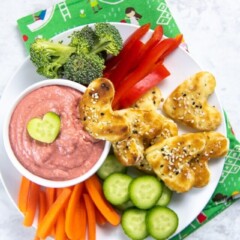
Get the recipe: Guide to Best Pregnancy Foods: Beet Hummus & Pita Chips
Ingredients
Beet Hummus
- 1 15 oz can of chickpeas, drained and rinsed
- 2 small roasted beets, see notes below
- 1 tbsp tahini, optional
- 1 clove garlic
- 1 lemon juiced
- 1/3 cup olive oil
- salt and pepper to taste
Pita Chips
- 2 pieces pita bread, naan or flatbread
- 1 tbsp olive oil
- 1 tsp seasoning of your choice flaky salt, everything seasoning, paprika, garlic powder, etc
Serve With
- chopped veggies – carrots, cherry tomatoes, cucumbers, celery, peppers, broccoli, cauliflower, etc
Instructions
- FOR BEET HUMMUS
- Place the chickpeas, beets, tahini, garlic, lemon juice and salt and pepper into a food processor. Start the food processor and slowly add half of the olive oil, let process for 1 minute, scraping down sides if needed. Continue processing, adding in the other half of olive oil if needed, until hummus is smooth and creamy.
- FOR PITA CHIPS
- Preheat the oven to 400 degrees F. Spray a baking sheet with cooking spray or line with a silicone mat. Place the pita bread on a cutting board and cut out the shapes using any cookie cutter you prefer – heart, stars, dinosaurs, flowers, etc. Or you can cut the pita into wedges.
- Transfer the shapes onto the baking sheet and brush with the olive oil. Sprinkle with seasoning (if using).
- Place the baking sheet in the oven and bake for 8-10 minutes or until golden brown. They will firm up while cooling.
Notes
Did you make this recipe?
Tag @babyfoode on Instagram and hashtag it #babyfoode!

